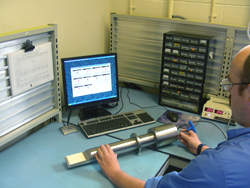Democrat November-December 2011 (Number 126)
Booklet review*
Reviving British Manufacturing
Why? What? How?
Since the 1990's Britain has been in the throes of chalking up an increasing balance of payments deficit. Dependence on the financial sector over manufacturing is all too obvious a factor. On their own, pound notes do not generate wealth.
As we know the financial sector made easy money through credit cards and mortgages. This meant manufacturing was deprived of monies to invest in machinery and equipment, research and development, and training. Once the 'workshop of the world' Britain has slipped to twentieth place in the manufacturing league. Britain now struggles to pay for imports of manufactures. With tighter controls over financial institutions being put in place there will be a reduced ability to enable Britain to pay for these imports.
 This raises the question discussed in this booklet – how is Britain going to pay its way in the world?
This raises the question discussed in this booklet – how is Britain going to pay its way in the world?
The author states the economics of how Britain ended up depending on the financial sector was "a combination of overcharging as a carefully concealed lack of competition, and gambling, in which financial services take the place of the bookies while the general public are the punters". The banks did not understand this dual process and abruptly stopped lending which caused business activity to falter and some banks to fail.
The decrease in economic activity brought about a huge reduction in public sector spending because taxes fell. Overseas borrowing replaced taxes and led to 'the markets' affecting public services.
There are three ways to improve the balance in trade in goods: consume less, make it in Britain and/or export more. To consume less is impractical except, as the ConDem government has done, through raising VAT.
Import replacement for exports is the answer. This means manufacturing, farming and mining must grow. However there is very little manufacturing left and has forced companies to either import components or move work elsewhere.
The author says: "The first job of a government industrial policy must be" to protect what industries are left.
The first measure is to prevent the sale of companies to interests outside Britain. The City would be opposed to this as they make money on such sales. Recent examples suffice to illustrate this point:
British Steel at Redcar was purchased by TATA and closed. Terry's Chocolates was bought by Kraft and moved to Eastern Europe. Parsons the inventor of steam turbines was purchase by Siemens and then closed. There are plenty more examples in the growing list.
Another list consists of Anglesey Aluminium which was closed because of Britain's compliance with EU legislation. Similarly Bombardier was not given a vital contract which instead went to Siemens in Germany. Such decisions would not have occurred in either Germany or France where workplaces and jobs are protected.
Another measure proposed is to increase consumption of products made in Britain instead of importing them, as long as they are of comparable good standard. Two pieces of protectionism which should be carried out by the government are cited. The Post Office uses Fiat vans where a near identical Ford van made in Hampshire is on the market. Likewise the police do not have to use foreign made cars in their fleets.
An indication of the level of manufacturing is the number of multipurpose, industrial robots. In 2004 Japan had 356,000; Germany and the USA had 120,000 each, France 28,000 and Britain just 14,000.
Since 1997 the ability to increase manufacturing output has fallen due to inflation. In 11 years 30% of the capacity has been lost.
Britain makes £150 billion manufactured goods employing about three million people equivalent to £50,000 output per worker. To reverse the decline in output and instead increase exports there is a need to increase the manufacturing workforce by 200,000 every year for ten years. That is five million workers in manufacturing instead of the current three million.
These and other related issues are discussed and backed up by statistics in this very useful booklet. Put alongside CAEF's position that Britain has to leave the EU the booklet is a must. It will help make Britain and its people prosperous.
* Alan Reece: Reviving British Manufacturing - Why? What? How?:
CIViTAS:52pp:£4